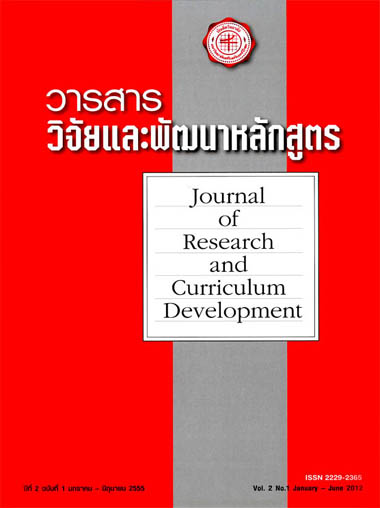ทุนทางอารมณ์และประเด็นทางการศึกษา
Keywords:
ทุนทางอารมณ์, สมรรถนะทางอารมณ์, อารมณ์, กระบวนการเรียนรู้, การศึกษา, emotional capital, emotional competencies, emotions, learning process, educationAbstract
งานด้านการศึกษาในสังคมตะวันตก อารมณ์ (emotions) มักไม่ได้รับความสนใจเท่าที่ควรจนกระทั่งแนวคิดด้านประสาทจิตวิทยา (neuropsychology) ได้เกิดขึ้นมา ส่งผลให้เกิดการปฏิเสธลัทธิแบบทวินิยม (cartesian body-mind dualsism) ที่ว่าด้วยธรรมชาติของมนุษย์ซึ่งประกอบด้วยกายและจิตใจ โดยแนวคิดด้านประสาทจิตวิทยาเห็นว่าคุณลักษณะด้านจิตพิสัย (affective domain) และด้านพฤติกรรม (conative domain) ไม่สามารถแยกออกจากพุทธิสัย (cognitive domain) ได้อีกต่อไป ในบทความนี้ผู้เขียนได้นำเสนอรูปแบบความคิดของทุนทางอารมณ์ (Emotional Capital: EK) ที่ได้พัฒนาขึ้นในปี 2004 ได้รับรางวัล Académie Française ในปี 2006 โดยให้ความหมายของทุนทางอารมณ์ว่าเป็น "ทรัพยากร (สมรรถนะทางอารมณ์) ที่ฝังตัวอยู่ในตัวของบุคคล มีประโยชน์สำหรับการพัฒนาบุคคล อาชีพและองค์กร รวมทั้งมีส่วนร่วมในความผูกพันทางสังคมด้วยผลตอบแทนที่ได้รับทั้งในส่วนบุคคล เศรษฐกิจและสังคม" ทุนทางอารมณ์เป็้นทุนสำคัญสำหรับทุกคนและในด้านการศึกษาเป็นทุนสำคัญที่จะส่งผลต่อกระบวนการเรียนรู้ของทุกคน โดยเฉพาะอย่างยิ่งสำหรับเด็กและคนวัยหนุ่มสามกลุ่มที่อาจมีความเสี่ยง ช่วยพัฒนามนุษย์ให้มีความสมดุลจากการมีส่วนร่วมในความผูกพันทางสังคม มีสัมพันธภาพอันราบรื่นกับเพื่อนมนุษย์ มีความสำเร็จในการดำรงชีวิตในสังคมของพวกเขาในอนาคต รวมถึงการยังคงเรียนอยู่ในโรงเรียนและประสบความสำเร็จ
Emotional Capital and Education Issues
In education as at work, in western societies, emotions have always been put out of the door. Since new insights from the field of neuropsychology have emerged, time has come to reject the cartesian body-mind dualism and to consider that the affective and conative domains cannot any longer be separated from the cognitive domain. In this paper, I will present the conceptual model of Emotional Capital (EK) that I developed in 2004, awarded at the Académie Française in 2006, defined as “the set of resources (emotional competencies) that inhere to the person, useful for personal, professional and organizational development, and participates to social cohesion, with personal, economic and social returns”. EK is an essential capital for all and precisely in education. EK is a crucial capital as it impacts people’s learning processes, especially for children and young people at risk, enables their balanced human development, which participates in social cohesion, smoother human relationships, their future successful life in the society and already to their school retention and success.


